THEME: INDUSTRIAL
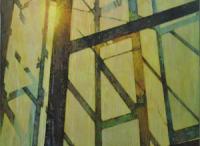 Chen Shijun's distinctive painting style mediates between digital and physical images. The Online Encyclopedia series, for example, takes prosaic images found while browsing online as its source material, and then interprets it through through heavy texturing and a nostalgic palette, converting the raw digital image into a final product with an exceptional sense of physicality. Online Encyclopedia: Daydream, takes an image of late afternoon sun, refracted through a myriad of window panes, as its subject. The painting has a dreamy, nostalgic effect, the sunlight lost in plays of light and shadow just as the mind escapes into absent-minded thought.
Chen Shijun's distinctive painting style mediates between digital and physical images. The Online Encyclopedia series, for example, takes prosaic images found while browsing online as its source material, and then interprets it through through heavy texturing and a nostalgic palette, converting the raw digital image into a final product with an exceptional sense of physicality. Online Encyclopedia: Daydream, takes an image of late afternoon sun, refracted through a myriad of window panes, as its subject. The painting has a dreamy, nostalgic effect, the sunlight lost in plays of light and shadow just as the mind escapes into absent-minded thought.
Click on the artwork for more information-
$35.00
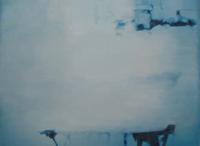 So abstracted is this painting that it is only its title that hints at its original source: The Experience of Reading Vision: Basin No. 11, suggesting that the canvas of light and dark blues depicts a common, every day object, a trough that collects rainwater. Yet how did an image of a phyiscal, tangible, identifiable object become duo-toned abstraction? In order to create the effect, Wang Chunli Select images from daily life, and take pictures for them. The process is an act of reduction, of creating visually manifested difference between the original and its facsimile. Wang Chunli then paints the image that results, a means of both reconstructing the image and tracing preserving the emotional qualities of its degenerative.
So abstracted is this painting that it is only its title that hints at its original source: The Experience of Reading Vision: Basin No. 11, suggesting that the canvas of light and dark blues depicts a common, every day object, a trough that collects rainwater. Yet how did an image of a phyiscal, tangible, identifiable object become duo-toned abstraction? In order to create the effect, Wang Chunli Select images from daily life, and take pictures for them. The process is an act of reduction, of creating visually manifested difference between the original and its facsimile. Wang Chunli then paints the image that results, a means of both reconstructing the image and tracing preserving the emotional qualities of its degenerative.
Click on the artwork for more information-
$35.00
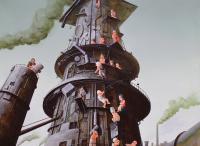 Zhu Zhiwei’s paintings dwell on the incredible scale of China’s industrialization, and the relationship between modern city-dwellers and the man-made environment that they inhabit. In Paradise—Chasing the Wind, factories obscure the horizon. The elongated format and multiple, skewed perspectives of create an intentionally disorienting, fantastical setting. The large central tower seems to be falling apart while it is swarmed by Zhu’s distinctive pink figures. Wearing sunglasses, they climb, dangle and perch on the tower’s nonsensical railings and ledges, creating the impression of an industrial playground. A few characters appear in heroic poses - climbing, carrying objects or helping each other scale the structure. Some sit idly, while others busy themselves pulling pieces off the tower or casting debris downwards. The painting’s lone woman, wearing a qipao (a traditional Chinese dress), dangles her heels, while two men engage in a fistfight down below. On the higher platforms several people. including a man in a red cape, look off into the distance. All appear to be oblivious to rickety state of the tower.
Zhu Zhiwei’s paintings dwell on the incredible scale of China’s industrialization, and the relationship between modern city-dwellers and the man-made environment that they inhabit. In Paradise—Chasing the Wind, factories obscure the horizon. The elongated format and multiple, skewed perspectives of create an intentionally disorienting, fantastical setting. The large central tower seems to be falling apart while it is swarmed by Zhu’s distinctive pink figures. Wearing sunglasses, they climb, dangle and perch on the tower’s nonsensical railings and ledges, creating the impression of an industrial playground. A few characters appear in heroic poses - climbing, carrying objects or helping each other scale the structure. Some sit idly, while others busy themselves pulling pieces off the tower or casting debris downwards. The painting’s lone woman, wearing a qipao (a traditional Chinese dress), dangles her heels, while two men engage in a fistfight down below. On the higher platforms several people. including a man in a red cape, look off into the distance. All appear to be oblivious to rickety state of the tower.
Amidst this flurry of activity, the tower’s purpose remains unclear; the top disappears into a dark, hazy cloud of smoke that drifts across the upper left-hand corner of the composition. The painting’s low vantage point and the strong diagonal lines formed by the tubes on either side of the tower create a disorienting perspective. Viewing the tower from its base, we too can contemplate climbing its dislocated staircases.
Click on the artwork for more information-
$35.00
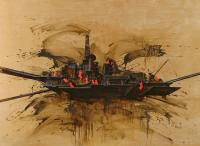 Zhu Zhiwei’s paintings dwell on the incredible scale of China’s industrialization, and the relationship between modern city-dwellers and the man-made environment that they inhabit. Modern Behemoth No. 1 depicts a multi-tiered, abstracted mass of blackened machinery and its twelve orange inhabitants. The wild brushstrokes that surround this structure convey a sense of wild motion and instability, which is reinforced by the viewer’s low vantage point and the cable swinging from the crane on the right. The dripping streams of black paint give a feeling of gravity and oily grime.
Zhu Zhiwei’s paintings dwell on the incredible scale of China’s industrialization, and the relationship between modern city-dwellers and the man-made environment that they inhabit. Modern Behemoth No. 1 depicts a multi-tiered, abstracted mass of blackened machinery and its twelve orange inhabitants. The wild brushstrokes that surround this structure convey a sense of wild motion and instability, which is reinforced by the viewer’s low vantage point and the cable swinging from the crane on the right. The dripping streams of black paint give a feeling of gravity and oily grime.
The twelve cartoonish characters are disproportionately large compared to the cranes and superstructure, but their oversize heads give them an infant-like appearance. They frolic about, while some vandalize machinery with glee. They appear to be unaware of the precarious state of the platform, much less its original purpose. The overall impression is that of an unsupervised industrial playground hurtling wildly through space.
Click on the artwork for more information-
$59.00
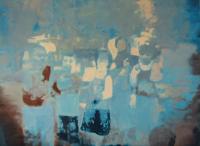 The youthful figures from Exponential Repetitions of Visual Readings: Play by Wang Chunli, are nostalgic and almost ghost-like, their forms barely fleshed out in a palette of blue, brown, and beige. Wang Chunli's painting technique is heavily mediated by the act of facsimile, making physical and digital copies of images until they are reduced to their essence. His painting style evokes the quality of memory; shapes shift and shimmer in an ether tempered by blue melancholy. The subjects are indistinct, as are the specifics of their presence, and it is perhaps the emotional tones of the painting that register most clearly.
The youthful figures from Exponential Repetitions of Visual Readings: Play by Wang Chunli, are nostalgic and almost ghost-like, their forms barely fleshed out in a palette of blue, brown, and beige. Wang Chunli's painting technique is heavily mediated by the act of facsimile, making physical and digital copies of images until they are reduced to their essence. His painting style evokes the quality of memory; shapes shift and shimmer in an ether tempered by blue melancholy. The subjects are indistinct, as are the specifics of their presence, and it is perhaps the emotional tones of the painting that register most clearly.
Click on the artwork for more information-
$35.00
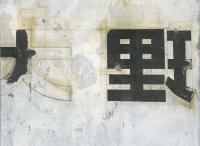 Chen Jiao's Dali depicts the characters for the Chinese city in southwest Yunnan province. It takes a moment to read the characters—the second character is positioned backwards—and they stand out more for their bold form and rich texture than their content, an effect achieved through layering colors and a variety of materials, such as paper, paint, chalk, and blackboard. Chen's use of signage is abstract even as her manipulation of medium creates a very specific effect—Dali has a quality of urban vibrancy about its embrace of the material, allowing a two-dimensional surface to invoke a myriad of social connotations, opening up the abstracted work to many possibilities.
Chen Jiao's Dali depicts the characters for the Chinese city in southwest Yunnan province. It takes a moment to read the characters—the second character is positioned backwards—and they stand out more for their bold form and rich texture than their content, an effect achieved through layering colors and a variety of materials, such as paper, paint, chalk, and blackboard. Chen's use of signage is abstract even as her manipulation of medium creates a very specific effect—Dali has a quality of urban vibrancy about its embrace of the material, allowing a two-dimensional surface to invoke a myriad of social connotations, opening up the abstracted work to many possibilities.
Click on the artwork for more information-
$35.00
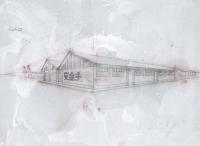 Chen Jiao's November 7th is named after a date, but features an industrial building, sketched lightly against a square grid. More than the building itself, its form stands out against the blank background, with perspective points and the foreground's boundary clearly visible. Against the front building's side, a slogan is available: “safe production,” painted in bold red characters. The final two characters are each drawn backwards, giving a clue that this is image is not actually meant to be a precise rendering of an actual structure. The markings of light color washes are visible in the background, and the work is dotted with Chen's calculations, leaving building measurements and calculations visible. But Chen is no architect. Trained in oil paiting at the Sichuan Fine Art Institute, Chen leaves the calculations visible as a means of voicing the utility and design that goes into the sketch, asking which meanings remain when the building is described in only its signs.
Chen Jiao's November 7th is named after a date, but features an industrial building, sketched lightly against a square grid. More than the building itself, its form stands out against the blank background, with perspective points and the foreground's boundary clearly visible. Against the front building's side, a slogan is available: “safe production,” painted in bold red characters. The final two characters are each drawn backwards, giving a clue that this is image is not actually meant to be a precise rendering of an actual structure. The markings of light color washes are visible in the background, and the work is dotted with Chen's calculations, leaving building measurements and calculations visible. But Chen is no architect. Trained in oil paiting at the Sichuan Fine Art Institute, Chen leaves the calculations visible as a means of voicing the utility and design that goes into the sketch, asking which meanings remain when the building is described in only its signs.
Click on the artwork for more information-
$35.00








